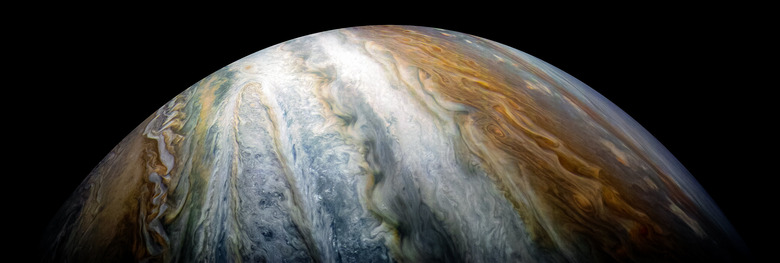Jupiter's Moons Create Invisible 'Killer' Waves That Could Destroy Spacecraft
Here on Earth, electromagnetic waves around the planet are typically pretty calm. When the Sun fires a burst of charged particles at the Earth we are treated to an aurora (often called Northern Lights), but rarely are they a cause for concern. If you were to head to Jupiter, however, things would change dramatically.
In a new study published in Nature Communications, researchers describe the incredible electromagnetic field structure around two of Jupiter's moons: Europa and Ganymede. The invisible magnetic fields around these bodies is being powered by Jupiter's own magnetic field, and the result is an ultra-powerful particle accelerator of sorts, which might be capable of seriously damaging or even destroying a spacecraft.
"Chorus waves" are low-frequency electromagnetic waves that occur naturally around planets, including Earth. Near our planet they're mostly harmless, but they do have the capability to produce extremely fast-moving "killer" particles that could cause damage to manmade technology if we happened to be in the wrong place at the wrong time.
Jupiter's magnetic field is many thousand times larger than the Earth's, and that means that moons like Europa and Ganymede actually orbit within their host's magnetic field while also producing their own. This results in chorus waves that are incredibly strong, and scientists now believe that the Ganymede is surrounded by waves a million times more intense than anything we've seen on Earth. The skies around Europa host waves that are "only" around 100 times more intense.
"Chorus waves have been detected in space around the Earth but they are nowhere near as strong as the waves at Jupiter" Professor Richard Horne, co-author of the work, explains. "Even if small portion of these waves escapes the immediate vicinity of Ganymede, they will be capable of accelerating particles to very high energies and ultimately producing very fast electrons inside Jupiter's magnetic field".
If enough of these "killer" particles were to strike a spacecraft things could go sideways very quickly. I guess it's a good thing that mankind has very little interest in visiting Jupiter in person.
